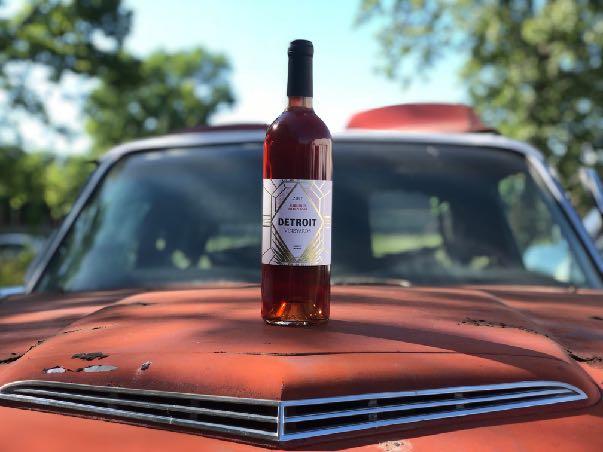
7 minute read
United States of Wine: Midwest Urban Wineries
United States of Wine: Midwest Urban Wineries By Kathy Merchant By Kathy Merchant
As the daylight hours of winter grow shorter, and the prospect of hunkering down for a few more months is upon us, most travel plans remain stuck on hold.
Advertisement
With a hopeful eye turned toward the possibility of travel in Spring 2021, what about a Midwest road trip organized around urban wineries? Detroit, Indianapolis, Cincinnati, Louisville—choose one or visit them all. There’s plenty more to do in each city to go along with a cool wine adventure.
But first, what exactly is an urban winery? Simple, right? It’s a commercial winery located in an urban environment rather than in a familiar vineyard and winery operation in a rural setting.
The full answer is a bit more nuanced.
Photo courtesy of winemag.com
Urban wineries are not new. About two decades ago, the first pioneering urban wineries started to emerge as grape-to-glass operations in urban settings. As wine has gained popularity across all adult age groups, urban wineries are gaining currency. A 2018 article in Food and Wine reported that urban wineries are on the rise and “they’re crushing it.”
There are three main types of grape-to-glass operations. One is managing vineyards in one place, say California, and making wine in a different urban location. Another approach is contracting with growers from multiple locations, trucking grapes to an urban location for crush to bottling, and then presenting the result in an adjacent tasting room. A third type involves hiring a dedicated winemaker who oversees an entire operation from grape to bottle, leaving just the last step—the glass—for the experience at the urban winery.
Now let’s plan a diverse trip starting in Michigan and heading south to Kentucky! These relative newcomers will welcome you with open arms. How fun to try something new from a familiar place, or something altogether new!
Detroit Vineyards “Superior Wines Made Right in the Heart of Detroit”
The owners of Detroit Vineyards (DV) first planted an acre of vines in 2015 in the Motor City’s East Side neighborhood. DV is committed to using all Michigan-grown grapes to produce wines ranging from crisp whites to full-bodied reds. In the meantime, while the metro Detroit vines mature, DV purchases grapes on contract from Western Michigan wineries. Everything else, from crush to bottling, happens in Detroit.
Grape varieties include familiar internationals such as Reisling and Pinot Noir, but the lineup also includes French hybrid grapes that grow well in the Midwest, including Traminette and Marquette.
“In the expansive (12,000 square foot) tasting room at Detroit Vineyards, the ancient pumps, tanks, and piping of the historic building stand in stark contrast to futuristic chandeliers and gleaming fermentation tanks. Here, vintage industrial Detroit meets modern design as fast and shiny as a new Ford Shelby GT.” (Michigan Today, 2/27/2020) Detroit Metro native Chris Southern was lured back to Michigan in 2019 as “El Jefe.” Southern learned the wine business as a second career in Michigan; Paso Robles, Napa, and Sonoma in California; Washington State; New Zealand; and South Africa.
Detroit Vineyards is open to visitors for tasting and tours now. The winery also offers hosted virtual tastings for those customers who prefer to taste in the comfort of their own homes. The cost is only the price of the bottle purchase (3 bottle minimum).
Peace Water Winery “Indiana’s only Locally Owned California Winery”
Scott Burton is a recovering Indianapolis lawyer. Shortly after he retired, wife Laura—mom to their eight children and manager of a fleet of animals—sagely encouraged Scott to find something meaningful to do. For the Burtons as a family, this meant finding a way to give back. Being fun-loving people, they thought “what better way to do it than share wine…and donate 50% of net profits to charity!” With every tasting, visitors get to choose a donation made to one of the eight charities pre-selected by the Burton children.
With three locations in downtown Indianapolis and nearby suburban areas, Peace Water sells only wines grown and bottled in Napa and Sonoma, California. Winemaker Brian Brakesman learned the ropes at his family’s winery, Napa’s Summit Lake Vineyards, where Brian still lives with his family in the Howell Mountain.
Peace Water offers a diverse selection of varietal and blended wines, all labeled with playful names that reflect the light and breezy spirit of the winery itself. The three tasting rooms are open every day except Monday, no reservations required.
Detroit Vineyards Bottle Photo courtesy of Detroit Free Press

https://detroitvineyards.com/ Open Wednesday through Sunday, hours vary Reservations required for tasting and tours 1000 Gratiot Ave. Detroit, MI 48207 (313) 265-3938 Detroit Vineyards can ship wine to 38 U.S. States

Peacewater charities

Downtown Indianapolis Mass Ave District 747 N College Avenue, Suite B Indianapolis, IN 46202 (317) 735-6618 Tasting Room Locations Hours vary by day (but not location) https://www.peacewaterwinery.com/
Carmel Art and Design District 37 W Main Street Carmel, IN 46032 (317) 810-1330 Fishers The Yard at Fishers District 11547 Yard Street, Suite 830 Fishers, IN 46037 (317) 537-2190

The Skeleton Root Winery “Paying Homage to Historic (vine) Roots in Cincinnati”
In the 1850s, Ohio was the largest wine producer in the United States, and Cincinnati was the epicenter. The star of that show was Nicholas Longworth who began experimenting with native American grapes in 1813, planting them in the area known today as the Mt. Adams neighborhood. His commercial success came in 1830 with the red Catawba grape, foxy and semi-sweet, beloved by Cincinnatians.
A dozen years later, the pink Catawba wine accidentally went through a second fermentation. The resulting bubbly was a global hit and fueled the dramatic growth of Ohio’s wine industry. Of course, all of that changed for Ohio with Prohibition, as it did across the country. Ohio never quite regained its footing until the late 20th century.
The Skeleton Root Winery builds on Ohio’s winegrowing history and neighborhood focus. Inspired by the deep-rooted wine heritage of the region, Kate MacDonald (an engineer) and Josh Jackson (a pilot) founded the urban winery in 2016. They purchase mostly native American heritage grapes under contract from various Ohio appellations, and winemaker Kate make all wines grape-to-glass at their Over-The-Rhine facility.
Some unique wines to try include Sparkling Cawawba made in the ancestral method (pétilant-naturel or “pétnat”), Seyval Blanc (white), and Norton (red).
Old 502 Winery “The Only Urban Winery in Kentucky”
Louisville can claim pioneer status as well as hip currency in the urban winery sector.
In 2002, an urban winery called River Bend (overlooking the Ohio River) launched in downtown Louisville. A decade later, a business refresh led to rebranding as Old 502 Winery (502 being the area code for Louisville). The winery outsources grapes but makes all wine on premises downtown.
Owners Jon Ryan Neace and Logan Leet offer this perspective: “Not having our own vineyard gives us the ability to craft some of the most eclectic — dare we say funky — wines you’ll ever have the pleasure of tasting. Forget what you know about wine and wineries. We’re breaking all the rules.”
Some of those rule-breakers include a semi-dry Bourbon Barrel Red, Bourbon Barrel Black made from the Norton grape, After Choc that “melts in your mouth, not in your glass,” and a white wine called Kentucky Lady made from all Kentucky-grown grapes.
Skeleton Root Cellar

http://www.skeletonroot.com/ Open Friday, Saturday and Sunday; hours vary Available to rent for weddings and corporate events 38 W. McMicken Ave. Cincinnati, OH 45202 (513) 918-3015

Photo courtesy of Old 502 Winery

https://old502.com/ Check website for tasting room reopening schedules Wednesday through Sunday 915 E. Liberty Louisville, KY 40204 (502) 540-5650

The tasting room is closed temporarily, in part due to the COVID-19 pandemic. Plans to move from the current downtown location (which is now closed) to a new facility in the Phoenix Hill/Nulu neighborhood were delayed, but not derailed. In the meantime, Old 502 Winery can ship to 43 states.












